Waiting for the next Canadian federal election
Sep 8th, 2009 | By L. Frank Bunting | Category: Ottawa Scene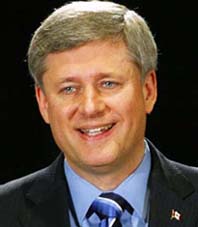
Prime Minister Stephen Harper at a news conference in Calgary Sept. 1, 2009. He argued on Sept. 2 that a fall federal election would hurt the Canadian economy.
On the Calgary Herald website there is a photograph of “Prime Minister Stephen Harper at a news conference in Calgary Sept. 1, 2009” – just after Michael Ignatieff announced “Liberals will vote against government.” And it is at least arguable that the prime minister looks a little like a cat who has just swallowed the canary.
It is still not clear that there will be yet another Canadian federal election this fall. But if there is, Mr. Harper could win a majority government at last. According to Don Martin at CanWest News, Harper’s “argument for a majority mandate will never resonate louder than having the Liberals force a pointless election amid signs that an economic recovery is on the way.”
Jeffrey Simpson at the Globe and Mail thinks: “Whatever happens in the November election that now appears all but certain, Canadians should end this string of minority governments. Only a majority government” will “have the political guts to make those hard decisions” that lie on Canada’s horizon (even if economic recovery really is in sight?).
If the Canadian people have also decided they want a majority government, as a poll this past July suggested, the Conservatives probably are your best bet – as things look today. But what we don’t know is just how things will look at the end of another fall election campaign, if there actually is one. So for the moment my answer to all federal election questions is still “maybe, maybe not”(in words I learned many years ago, from a smart girl at an Ottawa restaurant).
1. Does it make any difference that most Canadians still don’t want another election again, this soon after the last one?
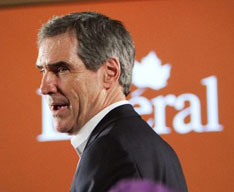
Le chef du Parti lib̩ral du Canada, Michael Ignatieff, a lanc̩ les hostilit̩s la semaine derni̬re en d̩clarant qu'il ne pouvait plus appuyer le gouvernement conservateur minoritaire. (cyberpresse.ca Рphoto: Reuters).
A few years back, when Stephen Harper was busy attacking Paul Martin’s Liberal minority government, I was talking with an Ontario political guru about the prospect of another federal election – which finally did happen on January 23, 2006. I noted then (summer 2005, more or less?) that even opinion polls showed most Canadians did not want another election, so soon after the last one in 2004.
I was told that most Canadians never want another election. Yet once one is called they mostly get into it anyway. (Or not, of course, as some 40% of the electorate have typically done over the more recent past, and not bothered to vote at all, in any election, ever: but that’s another story.) My guru friend had subtle Tory leanings, I thought. I have not seen him lately. I’m wondering what he thinks about the Canadians-never-want-another-election argument now?
An editorial in the September 3, 2009 Vancouver Sun has made similar claims. Liberal leader Michael Ignatieff has declared that his party will no longer support the Conservative minority government in parliament, which returns from its summer recess Monday, September 14. And, the Sun has suggested, “Harper’s response that Canadians don’t want another election is more of a hope than a rational assessment.”
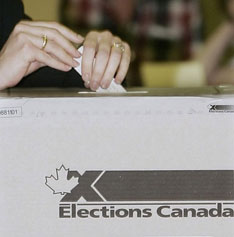
Whatever else, it’s elections that give the Canadian people their ultimate democratic voice ... and some people do like them, believe it or not.
At the same time, the Vancouver Sun goes on, “it may also be that if, as now seems all but certain, we are drawn into a campaign this fall, Ignatieff may find an outpouring of support for a majority Conservative government,” as enough voters “welcome the opportunity to end this long stretch of minority governments and the constant electioneering that goes with them.” (And remember, with our current democratically twisted electoral and party systems, it only takes about 40% of the Canada-wide popular vote to win a majority of seats in the federal parliament.)
At the same time again, what impressed me most about this September 3 Vancouver Sun editorial was its even-handed partisan balance. The highest-minded case for Stephen Harper’s two Conservative minority governments of the past three-and-a-half years is that they have brought Western Canada into the federal mainstream at last. From here you may think that voting the Harper Conservatives out of office will just alienate the West all over again. But if this were entirely true, the tone of the Vancouver Sun’s editorial would not be so open to Michael Ignatieff’s prospects (even as it also alludes to a possible “outpouring of support for a majority Conservative government”).
The tone of some Western Canadian commentary, especially from Alberta, implies that no one but Stephen Harper is acceptable in the West. It is at least some kind of good sign for Ignatieff, I think, that the Vancouver Sun’s editorial does not have quite this tone. (Note too how Ignatieff himself twittered – or is it tweeted on twitter? – somewhat after 9PM PDT, on September 4: “I’m humbled, thank you all for being here! 700 liberals in Surrey, proving we can do better.”) So, as the Vancouver editorial says, the notion that Canadians don’t want another election may well be “more of a hope than a rational assessment,”on the part of various hopeful parties.
2. What are the polls saying … have the times changed quite so quickly altready?
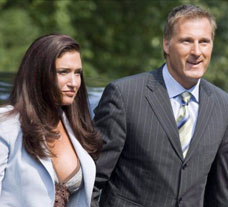
Ex-Foreign Affairs minister Maxime Bernier arrives at Rideau Hall on Aug. 14, 2007, with his then-girlfriend, Julie Couillard. Bernier lost his cabinet post when it was reported that he left sensitive NATO documents at Couillard’s home. A recent 2009 report in the Montreal newspaper Le Devoir says the documents contained 560 pages full of sensitive information stamped ‘Secret.’ This won’t help Conservative prospects in Quebec. (PAUL CHIASSON / CP).
Even a day can sometimes be a long time in politics. Right up until I was almost ready to post this report, there were only two most recent opinion polls to consider – one from EKOS-CBC, covering all Canada for the period August 26—September 1, and a Léger Marketing-Le Devoir survey confined to la belle province du Quebec for August 31—September 2. But just as we were going to press, so to speak, a third poll conducted by the Strategic Counsel for CTV and the Globe and Mail, for the period September 3—6, suddenly presented a rather different picture.
The Canada-wide EKOS-CBC poll shows 32.6% Conservatives, 32.6% Liberals, 16.5% New Democrats, 9.9% Green Party, and 8.3% Bloc Quebecois. Regionally, Conservatives are ahead of Liberals in all of Western Canada. But Liberals are ahead of Conservatives in all of Ontario, Quebec, and Atlantic Canada. Even New Democrats are ahead of Liberals in BC and Saskatchewan/Manitoba. At the same time, in Canada’s three largest big city regions – Toronto, Montreal, and Vancouver – the Liberals are ahead of both the Conservatives and the New Democrats. (The Liberals are even ahead of the Bloc Quebecois in Montreal, though just barely.) The Conservatives are ahead of both Liberals and New Democrats in Calgary and (intriguingly enough) Ottawa.
The L̩ger Marketing-Le Devoir survey in Quebec tends to confirm the general thrust of the Quebec regional results in the EKOS-CBC poll. In both cases the Bloc Quebecois is first (32.3% in EKOS and 35% in L̩ger Marketing). But the Liberals are a close enough second (30.9% in EKOS and 30% in L̩ger). The Conservatives are at least ahead of the New Democrats in EKOS (19.4% to 9.8%). But the same two parties are tied in L̩ger Рat 16%.
The latest EKOS-CBC poll has no hints of an August 18—20 Ipsos Reid survey for Canwest newspapers and Global television. This “put the Conservatives at 39 % among likely voters … with the Liberals down to 28 %.” (And this briefly suggested the Conservatives just might win a majority government in a fresh election.) The latest EKOS survey report also shows Conservatives and Liberals intermittently trading places with each other, within a rather narrow range of about 30—35%, ever since this past May.

Sunshine girl Jessica in Calgary Sun, Sept. 6, 2009: Not too worried about yet another federal election. (Perry Mah photo).
At this point, however, things do change somewhat. The still more recent Strategic Counsel poll for CTV and the Globe and Mail does not go as far as the August 18—20 Ipsos Reid survey for Canwest newspapers and Global television either. But it does put Canada-wide “Conservative support at 35% of voters. The Liberals are at 30%. The NDP are at 14, the Greens at 9 and the Bloc Québécois at 12.” The regional results are somewhat different as well. Again the Conservatives dominate in the West. But: “In Ontario, the two major parties are more or less tied (Conservatives 41, Liberals 39) with NDP support at a limp 11%, two points ahead of the Greens.” Even more dramatically, in Quebec the Bloc is at 49%, the Liberals at 23%, and the Conservatives at 13%.
The Strategic Counsel survey report also shows a somewhat different longer-term pattern, since this past May, than the EKOS survey report. I think it is fair to say that the Strategic Counsel reading generally has been somewhat less favourable to the Liberals. (Though it is worth stressing that this can’t reflect any partisan political bias: Peter Donolo who heads Strategic Counsel polling is a former communications director for Liberal Prime Minister Jean Chretien.)
It is also worth noting that the Strategic Counsel sample only takes in 1,000 Canadian voters. The EKOS sample is considerably larger, at 1,772 voters. (And thus, e.g., the regional breakdown is not so fine, or reliable, in the Strategic Counsel as in the EKOS survey.) The Globe and Mail report on the Strategic Counsel poll also notes that “Liberal internal polling is somewhat more positive, showing the two major parties running neck and neck (like the EKOS poll).”
All this having been said, it is certainly true as well, for the moment at any rate, that the most recent poll at our disposal does put the Conservatives five points ahead of the Liberals!
3. Are there still serious prospects that Jack Layton or even Gilles Duceppe will still finally keep the Harper government alive, at least until spring 2010?
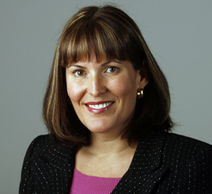
Licia Corbella of the Calgary Herald, who does not think there will be yet another federal election this fall, has also served on the board of directors of “The Centre for Faith and the Media ... an independent, non-profit organization to inform, advise and help media and the general public achieve a stronger understanding of spiritual history, practices and values in Canadian society.”
One of the more intriguing recent prognostications on Canadian federal politics is a September 2, 2009 piece in the Calgary Herald by Licia Corbella, entitled “Why there likely won’t be a fall election.” Ms. Corbella’s point of view can be summarized as follows:
“Yesterday, Bloc Leader Gilles Duceppe said he will always do what’s best for Quebecers and vote in the House of Commons issue by issue. Wanna bet he’ll just shrug his shoulders and declare that Quebeckers don’t want another election? And when he really can’t vote for something, it’s pretty likely the NDs will then find something to like? Both men will have each others’ private phone lines on speed dial …
“Or, here’s an even easier out. The Tories, with their 142 seats out of 308, only need 13 votes from another party to not lose a confidence vote. Either that, or 13 opposition members will suddenly come down with the swine flu … If I were a betting gal, I’d lay down a fair chunk of bacon that sniffles and purported cases of the swine flu will save us all from going to the polls this fall.”
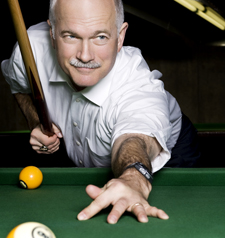
New Democrat leader Jack Layton ... He hustled Paul Martin way back when. Can he hustle Stephen Harper now? (Jason Kenney would say no ... he drinks his own Kool-Aid.)
My own first reaction to all this was that it reflected what the most stalwart Alberta supporters of Mr. Harper’s minority government would like to see happen more than any especially shrewd reading of the current twisted realities in Ottawa. But then I heard the pollster Darrell Bricker making a similar enough argument on a Toronto TV station – modified only by the view that the inevitable yet-another-fresh-election would at least be held off until the spring of 2010.
It is true enough as well that Mr. Ignatieff’s Liberals cannot bring down the Harper government without both the Bloc and the NDP on board. And in the wake of Ignatieff’s announcement that the Liberals will no longer be propping up the government, both M. Duceppe and (in particular) New Democrat leader Jack Layton have made certain kinds of vaguely friendly noises in Mr. Harper’s direction.
As Le Devoir has also noted, Stephen Harper’s recent appointment of former Manitoba NDP premier Gary Doer as Canada’s new ambassador in Washington – a genuine surprise, I would agree – has arguably softened the traditional sharp edges on relations between Canada’s main most right-wing and left-wing political parties.
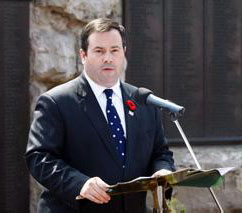
Jason Kenney, Minister of Citizenship, Immigration and Multiculturalism, says New Democrats are “hard-core left-wing ideologues” who “drink their own Kool-Aid.”
On the other hand, Conservative cabinet minister (and Harper confidant?) Jason Kenney has explicitly downplayed the prospect of any kind of Conservative-New Democrat alliance: “It’s a party of hard-core left-wing ideologues … It’s not like a moderate, centre-left party. These folks, they drink their own Kool-Aid right? So I don’t think we can see a realistic arrangement with the NDP.” And Stephen Harper himself has apparently half-seconded these remarks.
I was impressed as well by a remark of Chantal Hebert’s in one of her recent Toronto Star columns: “If the past 3 1/2 years have shown anything, it is that there is too big a gap between Stephen Harper’s brand of conservatism and the ideological outlook of the three main opposition parties to realistically hope for a cooperative minority Parliament under his rule.”
I don’t think this means that it will prove impossible for either the New Democrats or the Bloc Quebecois to give the Harper minority Conservative government enough support to keep the present 40th Parliament of Canada alive until, say, the spring of 2010. But I do think there are limits on Mr. Harper’s capacity for cooperation with any of the present opposition parties.
If he does finally strike some kind of deal with either the NDP or the Bloc, that will be almost as surprising as his recent appointment of Gary Doer in Washington. (And/or as Mr. Doer’s acceptance of the job – punctuated by his pronouncement that: “The old left-right jargon I believe is out of date and out of touch with the public.”)
4. Or will Harper himself finally engineer his own defeat?
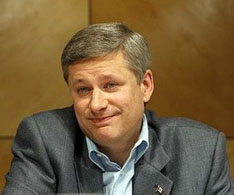
Minority Primer Minister Harper: does he really not want another election right now, even if it might give him a majority government at last? Maybe, maybe not.
As the Vancouver Sun has noted, Stephen Harper’s first response to all the current federal election talk in Canada – less than a year after the election of his second minority government (albeit with a dozen and a half more seats in Parliament than his party won in 2006) – has been that Canadians do not want another election right now, and neither does he.
At the same time, if it soon becomes altogether clear that both the New Democrats and the Bloc finally will be supporting a motion of non-confidence moved by the Liberals, Mr. Harper may prefer to engineer his own defeat in Parliament, on terms (hopefully somewhat) more favourable to his party in the fresh election that is bound to follow.
Chantal Hébert has even gone somewhat beyond this kind of proposition in one of her recent Toronto Star columns: “Given a choice, Harper sounds like he would rather see his government defeated than depend on the Bloc or the NDP for its survival. And Duceppe and Layton’s core supporters really have zero tolerance for a prolonged cooperative spell between their parties and the Conservatives … Notwithstanding the public assertions of the leaders, the current manoeuvres have more to do with establishing their respective places around the deathbed of the minority Parliament than with significantly extending its life.”
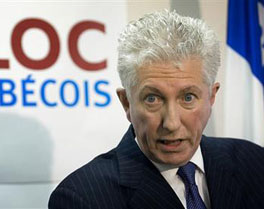
Bloc Quebecois leader Gilles Duceppe ... suddenly his poll numbers seem to be soaring ... and thanks to both Stephen Harper and Michael Ignatieff, the Quebecois have been recognized as a nation within a united Canada. (Does anyone still remember that?)
One way or another, in other words, Canadians could be looking out on a scenario sketched by Joan Bryden of The Canadian Press on September 2: “Some Liberals suspect Harper will provoke his own defeat by introducing a ways and means motion – implementing aspects of last January’s budget, including the popular home renovation tax credit – as soon as Parliament resumes on Sept. 14. Such motions are automatically deemed confidence votes. The Tory ploy would rob Ignatieff of his chance to defeat the government on Liberal terms, with a planned confidence motion in the first week of October. It would also force an election several weeks earlier than Liberals had intended and the Tories would try to sow some uncertainty about the Liberal stand on the home renovation measure.”
On September 4 Ms. Hébert reported that Gilles Duceppe had foreclosed at least the part of this prospect that involves trying “to sow some uncertainty about the Liberal stand on the home renovation measure.” More exactly: “Yesterday, the Bloc Québécois leader told Radio-Canada that if the government brings forward a supply motion to finance the home renovation program later this month, his party will support it … Unless Harper loads a budget-related motion with other items that are unpalatable to the Bloc, the tax credit will sail through the Commons.”
There would still seem some room for Prime Minister Harper to engineer his own defeat earlier rather than face a Liberal-engineered defeat later, even without the popular home renovation tax credit wrinkle. If he is going to be defeated anyway – and/or if Gary Doer’s appointment really doesn’t signal any kind of Conservative-NDP rapprochement – he might as well be the person guiding the process. On the other hand, he may be paying very careful attention to, e.g., Don Martin’s reporting that the Tory “argument for a majority mandate will never resonate louder than having the Liberals force a pointless election amid signs that an economic recovery is on the way.” (In which case the Liberals have to be quite clearly seen as “forcing” the election themselves – and the current highest wisdom, once again, is “maybe, maybe not.”)
5. Has Ignatieff done the right thing, in any case?
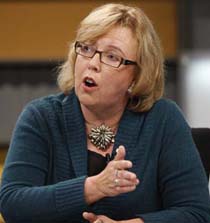
Green Party Leader Elizabeth May is already facing a complaint from a fellow party member over the Green nomination in the Saanich-Gulf Islands riding in BC. Which probably does not augur too well for her attempt to finally win a seat in Parliament in the next federal election, whenever it comes. (Photograph by Tom Hanson, Reuters files.)
There seems widespread agreement among many different commentators from different backgrounds that, as the Vancouver Sun has also urged, if there is an election this fall its ultimate result will have a lot to do with how the campaign unfolds – and especially with exactly how Michael Ignatieff performs: how he stacks up against Stephen Harper, or even Jack Layton, Gilles Duceppe, and the Green Party’s irrepressible Elizabeth May.
Another Conservative minority government may still be the most likely result. (And the latest Strategic Counsel poll certainly points in this direction.) But veteran pollster Nik Nanos told the Toronto Star on September 7 that he “doesn’t rule out a [Liberal]Â majority and says it hinges on the performance of the largely untested Liberal Leader Michael Ignatieff … ‘If he can somehow convey some extra advantage related to vision or appeal, his numbers are the ones most likely to be volatile and to move,’ Nanos said.” (Not everyone would agree with this judgment, of course – and Mr. Nanos is talking to the Toronto Star here, not the Calgary Herald.)
At the same time, yet again, there still may not actually be a Canadian federal election in the fall of 2009. All this has also happened before, in living memory. On September 4, 2007 the CBC was reporting that the latest parliamentary hi-jinks in Ottawa had set “the stage for a non-confidence vote that could trigger an election campaign – a vote and election campaign that could turn on Canada’s commitment in Afghanistan.” But in the end there was no federal election in the fall of 2007. In spite of all the noise nothing actually happened until the fall of 2008.

Liberal MP for Brampton Springdale, Ruby Dhalla (centre), with Michael Ignatieff supporters in Kelowna, BC.
Even if there is no federal election in the fall of 2009 either, however, Canadian political history may finally award the neophyte intellectual politician Michael Ignatieff some debating points. Whatever else, in his declaration that the Liberals will no longer support the Harper Conservative minority government he has taken his party out from under a burden that was doing it no real strategic good. The burden of making the Harper minority government work has now been placed on the New Democrats and the Bloc Québécois. And even if there is no election this fall, that could redound to the Liberals’ advantage, further down the road.
Jeffrey Simpson has recently written: “Only a majority government, or maybe a German-like ‘grand coalition’ of Conservatives and Liberals, would have the political guts to make” the “hard decisions” that he feels (and with some justice I think) lie on Canada’s horizon today. If a majority government, of any stripe, is just not in the cards the Canadian people believe they are holding at the moment – and that may prove the sad truth – the laboratory for fashioning any serious “‘grand coalition’ of Conservatives and Liberals” was the Employment Insurance Working Group that has met several times this summer, following a Conservative-Liberal deal to avoid a summer election, crafted last June.
When he announced several days ago now that the Liberals will no longer support the Harper Conservative minority government, Mr. Ignatieff also indicated that the Liberals would stop attending further meetings of the Employment Insurance Working Group, because the Conservatives are not serious about making this kind of collaborative arrangement work.
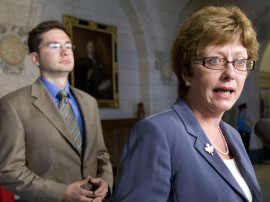
Minister of Human Resources and Skills Development Diane Finley speaks with the media about the EI working group as fellow committee member Pierre Poilievre looks on, September 3. (The Canadian Press). It has subsequently been reported “Tories to introduce own EI reform ... Human Resources Minister says changes to come in fall session; Liberals question why proposals weren't made to the bipartisan working group.”
Conservatives, drawing on a September 5 article by Jane Taber in the Globe and Mail, might urge that “Mr. Ignatieff and his strategists set out last June to map a course toward a fall election, believing they could not sustain supporting the Harper minority Conservative government without damaging their brand.” Liberals will say, drawing on the same article by Ms. Taber: “Mr. Ignatieff initially wanted to trust Mr. Harper, believing he was sincere that he wanted changes to the system … ‘I think Michael genuinely believed that if Harper showed some interest in his employment insurance stuff … Michael’s plans might have looked a lot different,’ a senior Liberal strategist said.”
You would have to have been a fly on the wall at this summer’s Employment Insurance Working Group meetings to go any deeper here. My own more vague sense, for what it’‘s worth, is that if there is any kind of prospect for “a German-like ‘grand coalition’ of Conservatives and Liberals” in Canada, it would have to be under the leadership of someone other than Stephen Harper. (And, from some recent remarks of Gary Doer, I’d guess as well that what he and Mr. Harper share is a degree of Western Canadian antipathy to the old power centres in Central Canada, and not really any public policy philosophy that transcends traditional distinctions between right and left: see Chantal Hebert’s remarks above on the great gap between “Stephen Harper’s brand of conservatism and the ideological outlook of the three main opposition parties.” )
6. The Obama factor … and what would be best for Canada, in the very end?
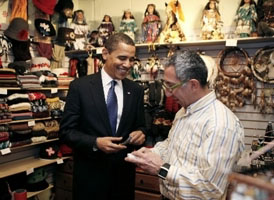
Obama a fait un arrêt surprise au marché By d'Ottawa où il a acheté un porte-clé.. (cyberpresse.ca).
One thing you are reminded of very strongly when you review the events of last summer that finally led to the last Canadian federal election, on October 14, 2008, is just how much political events in the true north strong and free at that point were overshadowed by the near miraculous electoral campaign of Barack Obama in the United States.
On September 6, 2009 the Canadian journalist Mitch Potter was writing in the Toronto Star about “How Barack Obama lost his mojo.” I am not sure myself that President Obama actually has lost his mojo. But there is no doubt that things are not quite so grim continentally, so to speak, for the kind of right-wing conservatism Stephen Harper is castigated for these days on Liberal strategist Warren Kinsella’s website. (E.g., “Canada [is] a second-tier socialistic country” ; “Canada is a Northern European welfare state in the worst sense of the term” ; “don’t feel particularly bad for the unemployed” ; “Human rights is in fact … totalitarianism,” etc, etc, etc.)
What impact could this have on yet another Canadian federal election in the fall of 2009? I confess I have no real idea – beyond the trivial guess that if Obama’s good times last year seemed to help out Stephen Harper in Canada, in some strange way, maybe his bad times will somehow help out Michael Ignatieff this year.
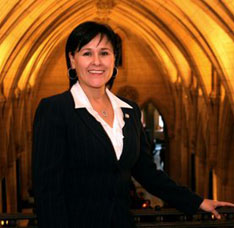
Leona Aglukkaq from Nunavut in the far north: Canada’s minister of health in the Harper government, 2009. You can’t say Prime Minister Harper has done everything wrong.
Much more importantly, I think, what we all ought to be doing at this juncture is figuring out just what would be best for Canada, in the very end? Of course just what we think about this subject will depend on whether we are Liberals, Conservatives, New Democrats, Bloquistes, or Greens, on just where we live in Canada, and no doubt on many other things as well. Without delving into all this, by way of conclusion here I will just quickly offer my own opinions on the matters directly at hand.
To start with, I don’t think I have any strong opinion on whether there ought to be yet another Canadian federal election this fall or not. I will just say two things: First, I don’t think anyone or any political party ought to support Stephen Harper and/or his minority government just to be public-spirited, if they don’t really like him or his government’s policies. To say that they should is not democracy; it’s just bullying.
Second, when I look at the current website of the Liberal strategist Warren Kinsella (whose father was Director of the Office of Medical Bioethics at the University of Calgary), I get the impression that the Liberals are now quite enthusiastic about an election soon enough. The lovely Jennifer Ditchburn at The Canadian Press has reported that “Warren Kinsella will direct the ‘rapid response’ team that will handle the day-to-day news cycle” in the Liberal campaign (whenever the election happens, presumably). And Kinsella (a modern-day Machiavelli,” according to the Toronto Sun) himself blogged on September 5, 2009: “There’s a lot of unsourced stuff in the morning papers about the merits of having an election now. It’s all fair comment, etc … Personally, I wanted one way before now … I like elections, so I’m always in favour of elections;” and on September 6 he wrote: “We’re days away. Get ready!” (And already, of course, the Liberals have started their own ad campaign. Now, whether the latest Strategic Counsel poll, which “gives Tories the edge,” will prompt further food for thought – who knows?)
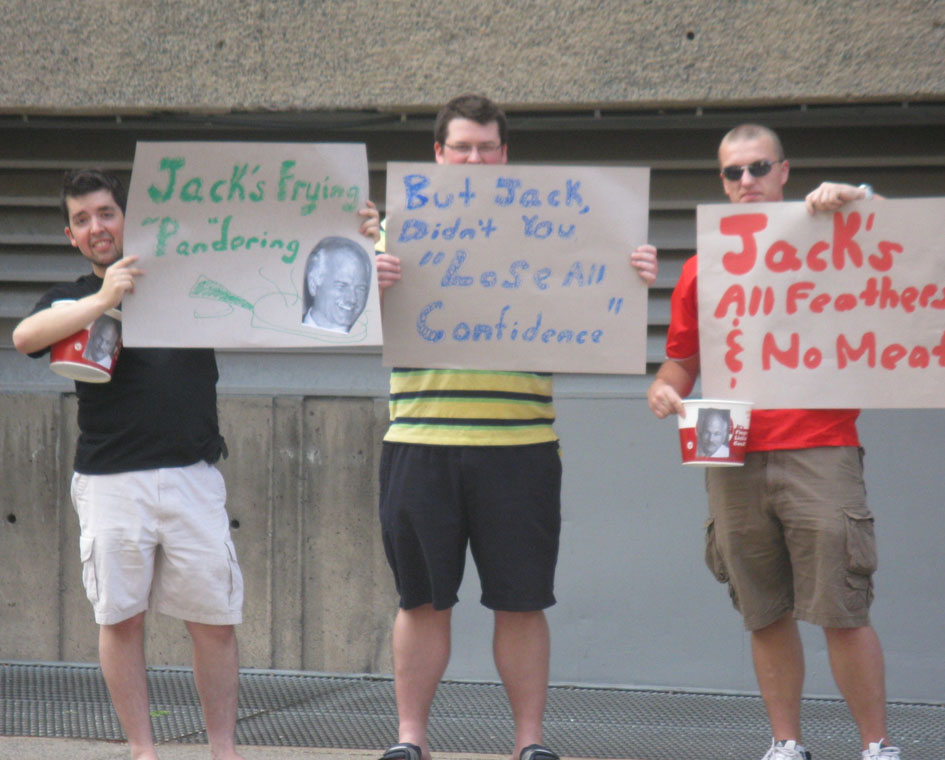
From Liberal strategist Warren Kinsella’s website, September 3, 2009: “Concerned young Haligonians express their unhappiness with Jack ‘Let's Make A Deal’ Layton.”
Assuming there is an election this fall (or in the spring of 2010?), I have just two further comments about my own preferences, for the moment at any rate.
First, I think Prime Minister Harper set a very troubling precedent late last year when he prorogued Parliament – or at least advised the excellent Governor General Jean to do so – to avoid the (quite constitutional) defeat of his government. If he is now re-elected, even as a minority prime minister, that will only lend further weight to the troubling precedent. In my view he probably ought to be defeated on this ground alone – regardless of any other virtues he may have (including his at least quite constructive role as a champion for Western Canada). Some will object, with some force, that hardly anyone nowadays really understands how our British-style or “Westminister” system of parliamentary democracy is supposed to work, and the kind of enormous slight to its traditions and norms of proper procedure involved in Mr. Harper’s prorogation late last year. Without going into any further details at this point, I would just say that I don’t accept this view. I do think our Westminster system has real advantages and is well worth preserving (albeit not with the so-called “constitutional monarchy” to which it is still attached in such places as Australia, Canada, Jamaica, and New Zealand, but not in such parliamentary democratic republics as India and Ireland).
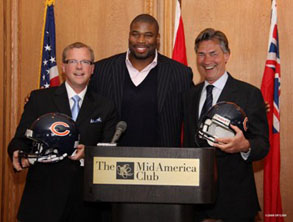
Visiting American neighbours: Premier Gary Doer of Manitoba (right) and Premier Brad Wall of Saskatchewan (left) with Israel Idonije of the Chicago Bears (centrer), a native of Winnipeg, Manitoba.
Second, I also think that our best chance for a stable government in Canada at the present juncture is some form of Liberal-New Democrat-Green alliance, or at least arrangement for practical co-operation in Parliament. In my wildest moments of hard political realism I confess I cannot really see how this could possibly happen in the present conditions of Canadian federal politics. But I think it is probably at least slightly more realistic than the conception of “a German-like ‘grand coalition’ of Conservatives and Liberals.”
As a very final note to this far, far too long preliminary report on the prospects of a fall 2009 federal election in Canada, I should probably confess as well that, like Warren Kinsella, I like elections, and am more or less always in favour of them. (Though I also do agree that we have been having rather a lot of them lately in Canada – as democratic as that still may be.)
For an update on Canadian federal politics as of Friday, September 18, 2009, see L. Frank Bunting’s In Brief report: “All fired up and ready to go in Canada?”


[…] Hasn’t Mr. Harper, e.g., started to think that a fall 2009 election might finally bring him a majority government at last? What was the point of his close colleague Jason Kenney’s recent talk about how the New Democrats are “left-wing ideologues†who “drink their own Kool-Aidâ€? How long is the NDP rank and file going to put up with supporting a historically right-wing ideologue minority prime minister, famous in the past for such declarations as “Canada [is] a second-tier socialistic countryâ€? […]